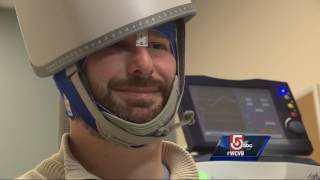This is the story of a patient Andrew, who struggled with depression since his teen years. When depressed, he’d find it hard to do anything. Medication has helped but his depression has been what we call, treatment resistant. And he is not alone. According to a 2015 study in World Psychiatry, 20-40% of patients with major depressive disorder (MDD), do not benefit sufficiently from conventional treatment. This is typically antidepressants with psychotherapy. Deep TMS does show some promise though, with higher remission rates. It generates focused magnetic fields, similar in strength to an MRI machine and targets specific areas of the brain believed to be involved in depression. The patient hears a series of taps. This is the sound of coils expanding and contracting thousands of times per millisecond creating that magnetic field which stimulates neurons in the brain. Not only is left prefrontal cortex targeted, but deeper structures of the brain are also targeted in hopes of restoring more normal levels of activity in the brain. Dr. Oscar Morales of McLean Hospital practices deep TMS on many patients who have treatment resistant depression. He is the co-author of one of the main studies that led to FDA approval of deep TMS for depression. It was found that at least 30% of patients experienced remission of their depression. Andrew says this treatment helped his symptoms without major side effects or discomfort. He finds it easier to get things done and activities of life seem less like large obstacles.

